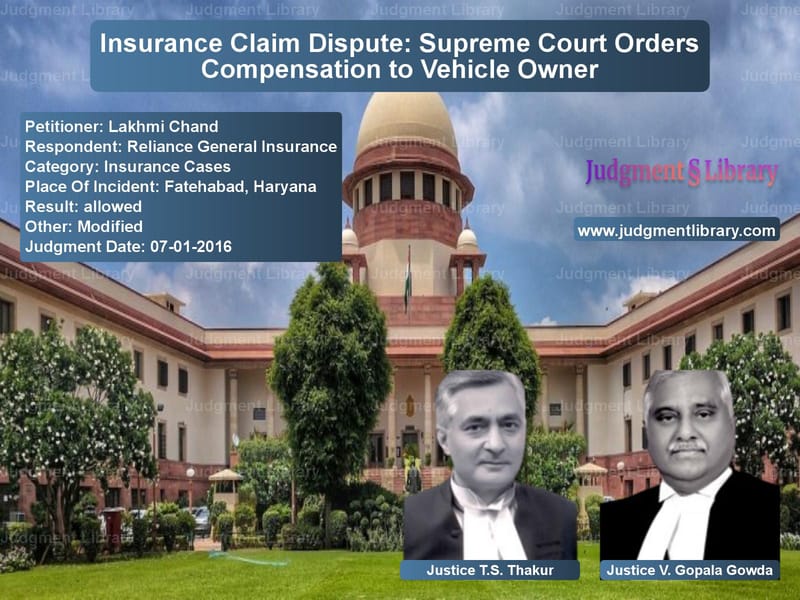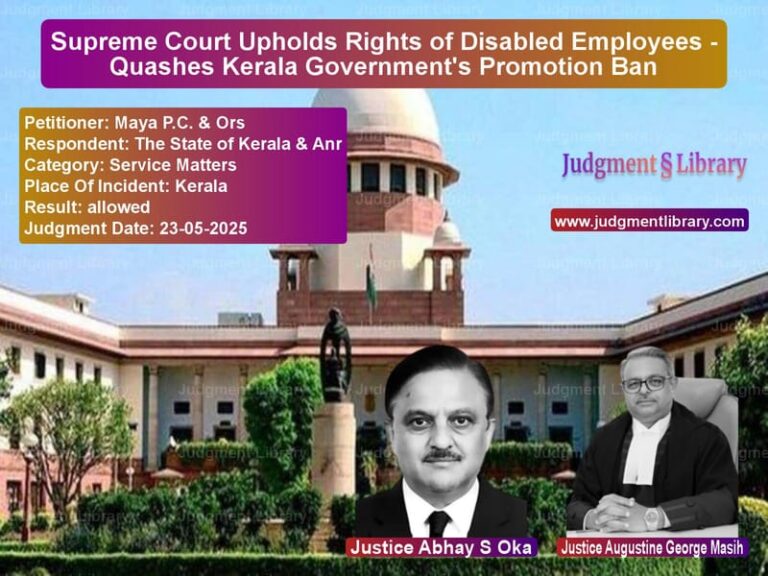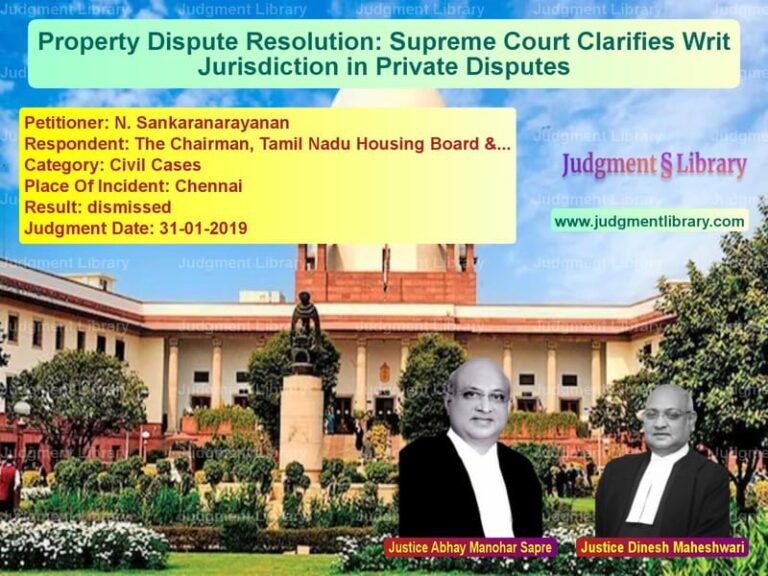Insurance Claim Dispute: Supreme Court Orders Compensation to Vehicle Owner
The case of Lakhmi Chand v. Reliance General Insurance is a significant ruling where the Supreme Court ruled in favor of the appellant, setting aside the decisions of the State Commission and the National Consumer Disputes Redressal Commission (NCDRC). The Court held that the insurance company’s denial of a legitimate claim for vehicle damage was unjustified and directed the insurer to pay compensation to the appellant.
Background of the Case
The appellant, Lakhmi Chand, was the owner of a Tata Motors goods-carrying vehicle bearing registration No. HR-67-7492. The vehicle was insured with the respondent, Reliance General Insurance, under policy No. 15019923334104992, valid from July 31, 2009, to July 30, 2010, with a sum insured of Rs. 2,21,153.
On February 11, 2010, the insured vehicle met with an accident due to the rash and negligent driving of another vehicle bearing registration No. UP-75-J 9860. The accident led to the registration of FIR No. 66 of 2010 at Sadar Police Station, Fatehabad, under Sections 279, 337, 304A, and 427 of the IPC.
Insurance Claim and Rejection
Following the accident, the appellant incurred repair expenses of Rs. 1,64,033 and informed the insurance company, which appointed a surveyor, Mr. Atam Prakash Chawla, to assess the damage. The surveyor estimated the repair cost at Rs. 90,000, much lower than the appellant’s claimed amount.
Additionally, the insurance company appointed M/s Innovation Auto Risk Claim Manager for an independent investigation. Their report found that at the time of the accident, the vehicle was carrying five passengers, violating the seating capacity of 1+1 as per the registration certificate.
Based on this finding, the insurance company rejected the claim on July 26, 2010, stating that the accident occurred under circumstances that violated the terms of the insurance policy.
Legal Challenge and District Forum’s Order
Aggrieved by the rejection, the appellant filed Complaint No. 517 of 2010 before the District Consumer Disputes Redressal Forum, Sonepat, under Section 12 of the Consumer Protection Act, 1986, arguing that the rejection of his claim amounted to a deficiency in service.
The insurance company countered that the policy violation (overloading passengers) justified the claim rejection.
The District Forum, relying on the National Commission’s decision in National Insurance Co. Ltd. v. Pravinbhai D. Prajapati, ruled that if the number of passengers did not contribute to the accident, the claim could not be denied solely on the grounds of overloading.
The Forum directed the insurer to:
- Pay 75% of the repair cost (on a non-standard basis) based on Rs. 1,64,033.
- Pay interest at 9% per annum from the date of claim submission.
- Pay Rs. 2,000 as compensation for harassment and litigation costs.
Appeal Before the State Commission
The insurance company appealed before the Haryana State Consumer Disputes Redressal Commission, citing the Supreme Court’s ruling in Suraj Mal Ram Niwas Oil Mills (P) Ltd. v. United India Insurance Co. Ltd., which emphasized that insurance contracts must be strictly interpreted and courts cannot modify the terms.
The State Commission overturned the District Forum’s order and dismissed the appellant’s claim, ruling that:
- Overloading passengers violated the insurance terms.
- The insurer was justified in rejecting the claim.
Appeal Before the Supreme Court
The appellant then approached the Supreme Court, which considered the following key issues:
- Whether overloading justified the rejection of the claim.
- Whether the insurer had to prove that the breach contributed to the accident.
- Whether the insured was entitled to claim compensation despite minor policy violations.
Supreme Court’s Analysis and Judgment
1. Overloading and Breach of Policy
The Court referred to B.V. Nagaraju v. Oriental Insurance Co. Ltd., holding:
“Mere overloading does not constitute a fundamental breach unless it directly contributes to the accident.”
2. Liability of Insurer
Quoting National Insurance Co. Ltd. v. Swaran Singh, the Court ruled:
“The insurer must prove that the breach of policy conditions directly caused the accident to deny a claim.”
3. Restoration of District Forum’s Order
The Court found that the National Commission failed to apply binding precedents and ruled:
“The findings of the National Commission are legally unsustainable. The insurer is liable to compensate the insured.”
Final Judgment
The Supreme Court ruled:
- The appeals were allowed.
- The District Forum’s order was restored.
- The insurer must pay 75% of the claim amount with 9% interest per annum.
- An additional Rs. 25,000 was awarded for litigation costs.
- The payment must be made within six weeks.
Key Takeaways
- Insurance claims cannot be denied solely on minor breaches.
- The insurer must prove that a policy violation caused the accident.
- Consumers have the right to challenge wrongful claim rejections.
- The Supreme Court’s decision provides a strong precedent for similar insurance disputes.
Conclusion
The ruling in Lakhmi Chand v. Reliance General Insurance strengthens consumer rights in insurance claims. The judgment ensures that insurers cannot arbitrarily deny claims based on technical breaches that do not contribute to accidents. This decision sets a benchmark for fair claim settlements and protection of policyholders’ interests.
Don’t miss out on the full details! Download the complete judgment in PDF format below and gain valuable insights instantly!
Download Judgment: Lakhmi Chand vs Reliance General Ins Supreme Court of India Judgment Dated 07-01-2016.pdf
Direct Downlaod Judgment: Direct downlaod this Judgment
See all petitions in Other Insurance Cases
See all petitions in Motor Insurance Settlements
See all petitions in Judgment by T.S. Thakur
See all petitions in Judgment by V. Gopala Gowda
See all petitions in allowed
See all petitions in Modified
See all petitions in supreme court of India judgments January 2016
See all petitions in 2016 judgments
See all posts in Insurance Cases Category
See all allowed petitions in Insurance Cases Category
See all Dismissed petitions in Insurance Cases Category
See all partially allowed petitions in Insurance Cases Category







